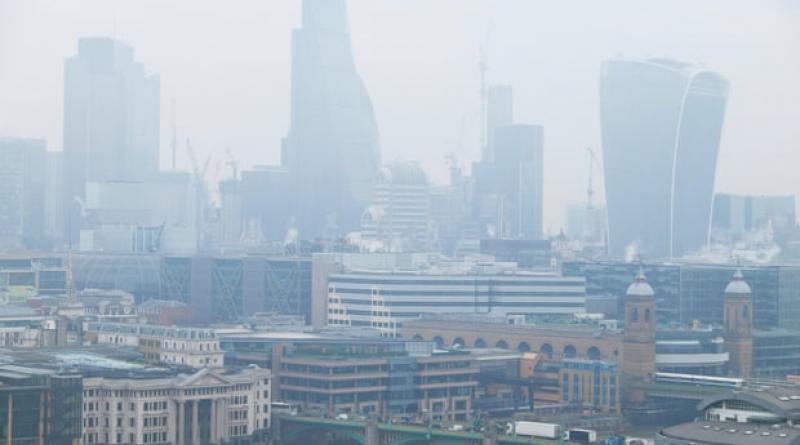Scientists and climate advisers condemn Tory environmental record.

The Conservative party’s record on tackling the climate crisis has been condemned by leading scientists and former government advisers, as the Labour leader, Jeremy Corbyn, warned that the forthcoming election was the last chance to halt the escalating emergency.
Experts accused the Conservatives of copying rightwing politicians in the US by deliberately weakening environmental protections. Meanwhile, analysis by Labour reveals that environmental policies put forward since 2017 and opposed by the Tories would have led to emissions reductions of over 70m tonnes a year by 2030 – more than the annual emissions of Portugal.
The climate emergency has become a key battleground in the election, with Labour promising a transformative green industrial revolution, the Liberal Democrats pledging to spend billions on the crisis, and the Conservatives announcing a pre-election moratorium on fracking and pledging to plant 30m trees a year by 2025.
On Sunday, Labour leader Jeremy Corbyn said the Conservatives could not be trusted on the environment. “This general election is our last chance to radically change course, or face the threat of a hostile and dying planet,” he said. “The science is clear – we don’t have time to waste.”
He said Labour’s green industrial revolution would create hundreds of thousands of “good, clean jobs that will transform towns, cities and communities that have been held back and neglected for decades”.
The Conservatives have come under increasing pressure on the climate crisis during the election campaign and recent analysis shows they are on course to miss several key environmental targets. Boris Johnson is the only party leader to have refused to take part in a TV climate debate, and he drew anger in Yorkshire last week when confronted by people whose livelihoods had been devastated by the floods. In Somerset, Johnson dodged environmental protesters, whom he later dismissed as “crusties”.
Leading scientist David King, a key government adviser on the climate crisis until 2017, questioned whether Johnson could be trusted on the environment. He said he would give the Conservatives no more than three or four out of 10 for their record on tackling the climate crisis.
“I wouldn’t give them a pass mark. The leadership has simply not been there,” said King, who was Britain’s climate ambassador at the Paris talks that led to the landmark 2015 agreement pledging to keep global heating below 2C, or 1.5C if possible.
“The government has completely taken its eye off delivery and it has not been as consistent as it needed to be. If there isn’t support across the board from No 10, then it’s not going to happen.”
He added: “The Conservatives are trying to be greener than the other parties, but I wonder just how much we can trust the Conservative party leadership at the moment.”
Tom Burke, a former senior adviser to three Conservative environment secretaries, said the government’s record was a disgrace and accused it of aping the libertarian right in the US.
“The current government has systematically weakened the capacity of this country to manage its environment. It’s been done by stealth.
“They have taken a lesson, I suspect quite consciously, from the libertarian right in the US that you won’t win the argument about weakening environmental standards, so you don’t argue it. What you do is you weaken the capacity to make them effective.
“They have completely cut the budgets of the Environment Agency and Natural England and they have systematically reduced their independence,” said Burke, who was a senior adviser to the Foreign Office special representative on climate change from 2006 to 2012 and now runs the environmental thinktank E3G.
In a much vaunted announcement, the Conservatives this year committed to making the country carbon net zero by 2050. But their own climate change committee, in its latest analysis of their performance, said there was a growing gap between Britain’s carbon cutting ambition and the policies in place to achieve it.
The committee said the government was likely to miss greenhouse gas emissions reduction targets from 2023 onwards, there was still no serious plan for decarbonising UK heating systems, and a tree planting target of 20,000 hectares a year in the UK was not being met.
In other key areas, including tackling illegal levels of air pollution – which,the latest government data shows, covers 83% of the country – and water quality, the Conservative government is likely to fail to meet its legal obligations and targets. It is also set to miss targets for boosting renewable energy such as onshore wind and solar, according to a Greenpeace analysis.
Carbon emissions from transport, which is responsible for a third of UK greenhouse gas emissions, remain static.
Katie Nield, a lawyer for Client Earth, which has successfully taken the government to court on several occasions for its failure to clean up air pollution, said the Tories’ record on tackling toxic air was poor. “We have had these legal limits for nitrogen dioxide since 2010 in place – that’s almost 10 years. Yet they have still not met them. That is despite having a very clear idea of where the problems are, what the causes are and what potential solutions there are. And a failure to act in that context is quite shocking.”
The analysis from the Labour party shows that policies opposed by the government on onshore and offshore wind power, home improvements and insulation, tidal power and transport would have led to nearly 70m tonnes of CO2 emissions savings per year by 2030.
Luke Clark, from Renewable UK, the renewable energy industry trade association, said the government in the last five years had excluded onshore wind and solar from the competitive market for renewable projects, which had led to an 80% fall in onshore wind installed in 2018, compared with the previous 12 months.
“If [we] are not using cheap sources like onshore wind and solar, we are slowing down the process of how quickly we can achieve decarbonisation,” said Clark. “To tackle the climate emergency, we need all these options.”
Greg Archer, a director of the zero-emissions pressure group Transport & Environment, in a new analysis of the Conservatives’ nine-year freeze on fuel duty, said the policy had put the equivalent of 2.5m additional cars on the road.
“Conservative action to tackle transport emissions has been a story of wrong priorities, little action and missed opportunities, and whilst it has talked green, transport emissions have flatlined for 10 years,” said Archer. “Grants for electric cars have been cut and are scheduled to end in March 2020, stalling progress.”
In addition, UK aviation emissions were forecast to continue to rise, but the government was advocating additional runways, including the Heathrow third runway and new terminals, said Archer.
Next year will be a critical in the fight to tackle the climate crisis, with the UK hosting the most important climate conference since the 2015 Paris agreement was signed. Experts say that will lead to unprecedented scrutiny of the environment policies of the new government, which will set the tone for the international response to the escalating global emergency.
A Guardian investigation earlier this year found Conservative MPs were almost five times as likely to vote against climate action as legislators from other parties. Boris Johnson was among several dozen MPs, mostly Conservatives, who recorded the worst possible score of zero on the Guardian’s climate scorecard of MPs.
Theresa Villiers, the environment secretary, said: “The Conservatives have taken world-leading action to tackle climate change – legislating to achieve net zero, reducing emissions by a quarter since coming to office in 2010, and boosting renewables to record levels.
“We have set manageable targets that will bring society with us. Corbyn’s Labour would ban people from using their cars or taking flights, and their plans have been slammed by their own unions as ‘utterly unachievable’.
“Only Boris Johnson and the Conservatives will get Brexit done so we can continue tackling climate change while successfully growing our economy.”
17 November 2019
The Guardian




